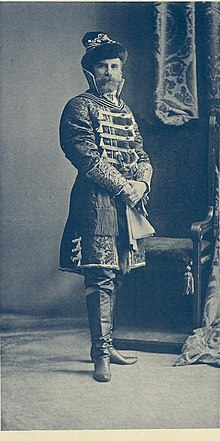You can help expand this article with text translated from the corresponding article in Russian. (February 2019) Click for important translation instructions.
|
| Freiherr Konstantin von Stackelberg | |
|---|---|
 Baron von Stackelberg in 17th century Russian court clothing during the 1903 Ball. Baron von Stackelberg in 17th century Russian court clothing during the 1903 Ball. | |
| Born | 15 June [O.S. 3] 1848 Strelna, St. Petersburg, Russian Empire |
| Died | 30 March 1925(1925-03-30) (aged 76) Tallinn, Estonia |
| Buried | Narva |
| Allegiance | |
| Service | |
| Years of service | 1866-1917 |
| Rank | |
| Children | 2 children |
Konstantin Nikolai Freiherr von Stackelberg (Russian: Константи́н Ка́рлович Шта́кельберг, tr. Konstantín Kárlovich Shtákelʹberg; 15 June [O.S. 3] 1848 – 30 March 1925) was a Baltic German composer and cavalry general in the Imperial Russian Army. Stackelberg was best known for his compositions on music about the White Army during the Russian Civil War. He was the head of the Imperial Music Choir from 1883 to 1917 (now the St. Petersburg Philharmonic Orchestra) and was also involved in improving the music in the Russian Army and Navy.
He was awarded Order of Prince Danilo I, Order of the Cross of Takovo and a number of other decorations.
References
- Regarding personal names: Freiherr is a former title (translated as 'Baron'). In Germany since 1919, it forms part of family names. The feminine forms are Freifrau and Freiin.
- The Violin Times: A Journal for Professional and Amateur Violinists and Quartet Players. 1895.
- Tarr, Edward H. (2003). East Meets West: The Russian Trumpet Tradition from the Time of Peter the Great to the October Revolution, with a Lexicon of Trumpeters Active in Russia from the Seventeenth Century to the Twentieth. Pendragon Press. ISBN 9781576470282.
- Acović, Dragomir (2012). Slava i čast: Odlikovanja među Srbima, Srbi među odlikovanjima. Belgrade: Službeni Glasnik. p. 628.